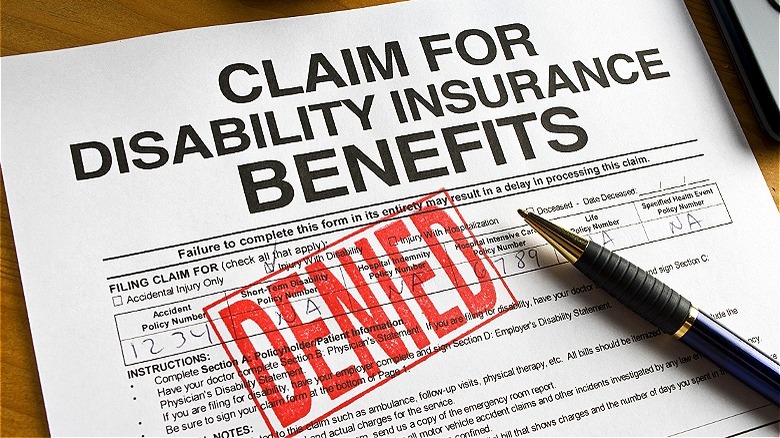This Is The Best Age To Consider Disability Insurance
Here at Money Digest, we frequently advocate for budgeting to live within your means, establishing an emergency fund, contributing toward retirement, and other healthy financial habits. Yet something that's seldom discussed is the need for disability insurance to protect you and your family from loss of income — either temporarily or permanently — due to an illness or injury.
The Social Security Administration reports there's a whopping 25% chance that an employee will miss at least one year of work between age 20 and retirement because of a disabling condition. And that disability might not take the form that you would expect either, such as an on-the-job injury. Other common reasons for disability include pregnancy, cancer, and mental health issues.
But wait, doesn't the United States government automatically provide disability insurance through Social Security? Indeed, it does. However, the Social Security Disability Insurance (SSDI) can leave something to be desired. Just like regular Social Security for retirement, SSDI is an earned benefit that requires you to pay in a certain amount via payroll tax in order to be eligible to collect. For 2024, the maximum benefit from SSDI to a disabled worker is $3,822 per month. This said, the average payment is a much lower $1,537 per month, plus any monies that family like spouses and children may also be eligible to collect.
Middle age is a good place to start
Besides limited financial compensation, government-provided disability insurance also has a strict vetting process. For example, an applicant must prove they're unable to work in any field whatsoever, not just their prior field of employment. For some workers, a better choice might be to buy private disability insurance, sometimes called disability income (DI) insurance, from a third-party provider. However, determining when (i.e., what age) to seek out this extra financial protection from loss of income is a little trickier.
According to Bank of America insurance executive Robert Murray, a person should consider this type of insurance as early as 20 years old. Said Murray, "Especially if you have kids or others who rely on your earnings, this is crucial insurance for someone between the ages of 20 and 50." Forbes, meanwhile, puts a finer point on when to get disability insurance, pointing out that it isn't only for people in their 50s or 60s. In fact, if you're in your 40s, the outlet says this is the age to consider getting coverage if you don't yet already have it.
When viewing policies, know that there's short-term DI that typically pays for loss of income for up to two years or long-term coverage that pays until retirement age or even your entire life. Before you rush to purchase your own policy, though, note that little more than four in 10 private employers offer short-term disability insurance built into their standard benefits package for employees. Though far fewer offer long-term disability as a perk.
Expect to pay between 1% and 3% of your salary
Even if your employer does provide some degree of disability insurance coverage, you may want to supplement it with additional coverage you purchase on your own. That's because employer-provided coverage may only provide benefits equal to about 60% of your lost salary. If your job is the primary source of family income, that may not be enough to meet expenses like a mortgage or contributing to your child's education via a 529 plan. That's coupled with the fact that other job-related benefits, like health insurance, may be lost when the employment relationship ends.
So how much does private disability insurance cost? According to online insurance marketplace Policygenius, about 1% to 3% of your annual salary, with the average cost coming to about $2,200 per year. Note, older workers or those with preexisting health conditions can expect to pay more.
Depending on your employer's degree of coverage — if any — it might be worthwhile for younger workers to consider purchasing private disability insurance. However, those 40 years old and up will want to investigate coverage more seriously. That's because there's less time to recover from a blow to their earnings. You've worked hard to save and invest for your retirement, so you don't want to exhaust those funds on living expenses in the present day.


